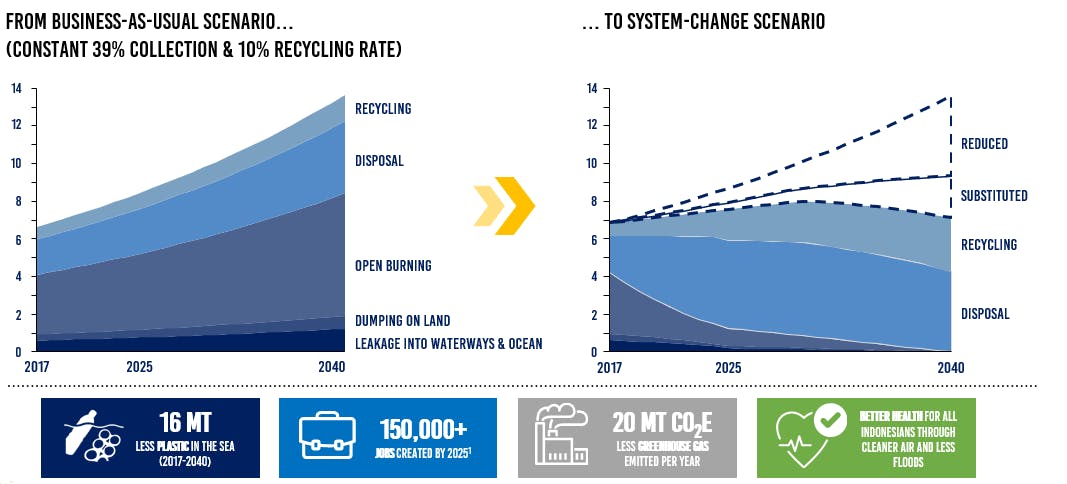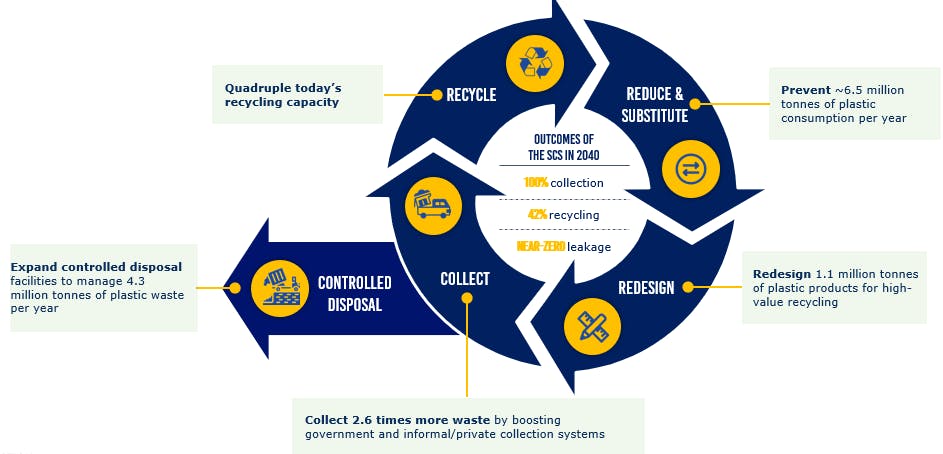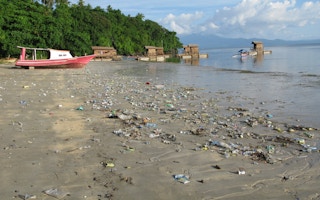A new analysis published in the journal Science shows that the business-as-usual approach to tackling ocean plastic pollution isn’t working. Even worse, should we continue down the current trajectory, plastic waste going into the ocean is set to triple by 2040.
To continue reading, subscribe to Eco‑Business.
There's something for everyone. We offer a range of subscription plans.
- Access our stories and receive our Insights Weekly newsletter with the free EB Member plan.
- Unlock unlimited access to our content and archive with EB Circle.
- Publish your content with EB Premium.
But what’s unique about this study, Breaking the Plastic Wave, is that it focuses on the solutions that can stop this crisis in its tracks. Using all the technology that exists today, we can reduce ocean plastic flows by 80 per cent – and with additional investment channelled into innovation, we can get closer to 100 per cent.
In countries like Indonesia, whose abundant coastlines, rich biodiversity and marine economy are under acute threat from the unabated rise in plastic pollution, action simply cannot afford to wait any longer. That’s why Indonesia has become the first nation to put many of the recommendations from this study into practice.
In April this year, the Indonesia National Plastic Action Partnership – a collaboration platform created by the Government of Indonesia and the World Economic Forum’s Global Plastic Action Partnership – released the Indonesia Multistakeholder Action Plan, a bold roadmap that proposes a path to reduce the amount of plastic leakage into Indonesia’s oceans by 70 per cent by 2025, as well as achieving near-zero plastic pollution by 2040 through transitioning to a circular economy for plastics.

Image: World Economic Forum

Image: World Economic Forum
This Action Plan wasn’t conceived in a vacuum; instead, it focuses on tangible, tailored solutions that can realistically work for Indonesia in areas such as increasing waste collection capacity and promoting plastics alternatives. Its analysis was adapted from the aforementioned study, co-authored by SYSTEMIQ and The Pew Charitable Trusts; the underlying data came from all over Indonesia and its recommendations were shaped through close collaboration and consensus-building with leading plastic waste and pollution experts in Indonesia across every sector.
How does this work in practice?
Developing the Multistakeholder Action Plan was an essential first step to creating a joint national strategy, endorsed and supported across the government, industry, civil society and academia. We have now entered the next phase: Implementing the system changes proposed in the Action Plan.
First, while action will be driven by the diverse partners of the Indonesia platform, a successful implementation process requires a central coordination body to ensure that efforts and deliverables across partners are clearly defined, constantly aligned and interconnected. We are proud to partner with the World Resources Institute (WRI) on this front: Not only does WRI act as our secretariat’s home base in Jakarta, it also brings decades of deep country experience to co-steering our direction and work plan for the next five years.
Next, to take the solutions in the Action Plan forward and to ensure that our partners are making concrete contributions towards our common goal, we have distributed responsibilities and deliverables to our platform members through the launch of five task forces: Policy, financing, innovation, behaviour change, and metrics, each consisting of over 20 members. Here’s a quick overview of what each task force has been up to:
- Financing: The first task force to launch under the leadership of the Asian Development Bank and the Indonesian Ministry of Finance, this group will soon release a financing roadmap that assesses current financing gaps and presents potential financing models with key partners that can help finance the heavy-lift system changes of the Action Plan.
- Innovation: This task force has started mapping existing solutions and gaps in innovations needed to achieve the system changes that can get Indonesia to its 70 per cent target. We are looking into organising innovation showcase and pitching events with the help of an extensive global network of experts, technology providers and impact investment partners.
- Metrics: This task force is moving equally fast with ambitious plans to enhance data collection, align on measurement standards at the national level, and ensure a consistent approach to reporting Indonesia’s progress on eradicating plastic pollution over the next few years.
- Policy: This group will formally kick off in October. Led by the World Bank Group and the Coordinating Ministry for Maritime Affairs and Investment, it will conduct a deep analysis of existing policies, outline recommendations on policy models that have proven successful in similar contexts and a long-term implementation plan to assist the government and all involved partners towards a policy framework needed to achieve the proposed system changes.
- Behaviour change: This task force aims to use the visibility of the platform to support and amplify the public awareness and behaviour change campaigns taking place in Indonesia, especially those led by local leaders and advocates.
Many of the lessons from Indonesia will be transferrable to other countries
Indonesia is leading the way on addressing the ocean plastic challenge – and it is showing that while it is necessary and crucial to dedicate valuable resources to fighting the Covid-19 crisis, we also cannot afford to ignore the long-term challenges that loom in the background.
Parallel action plans are currently under development in Ghana and Vietnam, two other trailblazing countries that have signed up to collaborate with the Global Plastic Action Partnership and the World Economic Forum to advance plastic pollution action. While every country faces unique challenges, we know that many of the lessons from these three countries can be replicable at a wider scale, from reducing reliance on single-use plastics to boosting recycling infrastructure to keep up with existing levels of plastic waste.
We welcome any organisation that is interested in joining our platform to contribute to this crucial sharing of knowledge and resources. Please drop us a note at indonesia@globalplasticaction.org to start a conversation.
Sri Indrastuti Hadiputranto is chief executive of the United in Diversity Foundation and chair of the Indonesia National Plastic Action Partnership.
Ben Dixon is a partner at systems change company SYSTEMIQ.
Madeleine Brandes is a knowledge specialist at the Global Plastic Action Partnership, World Economic Forum.










